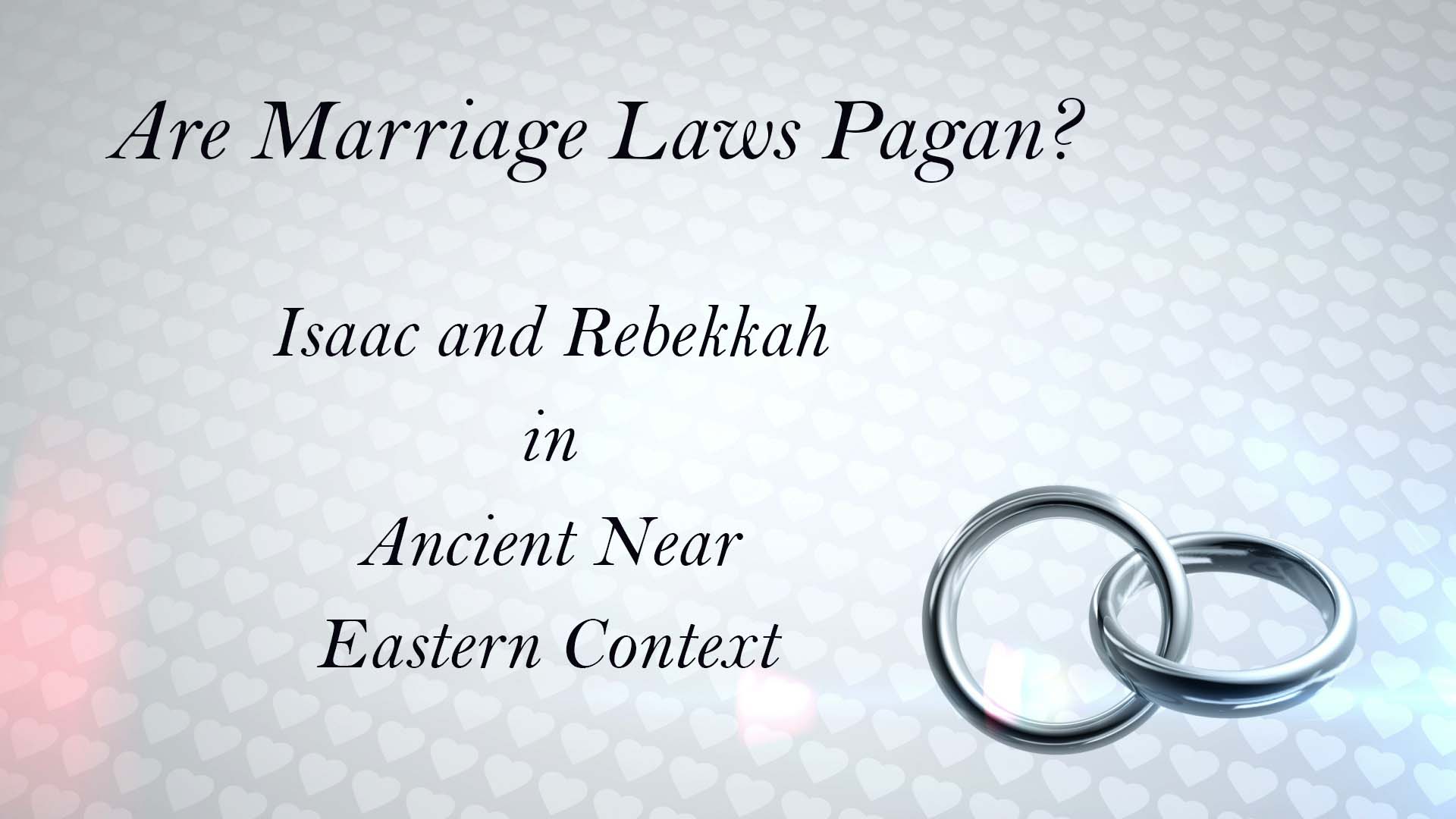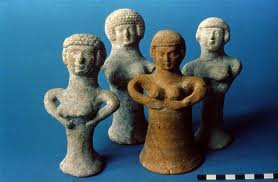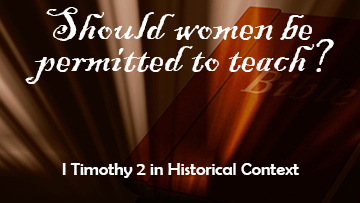If I had a dime for every woman who believed the doctrine that they don’t need a marriage certificate to get married and that they can just hook up with a guy, who then went and actually did just that; who got used up and abandoned, even though she was in possession of a self-made Ketubah signed by “witnesses” who then didn’t hold the man who she was shacking up with accountable (and indeed, had no legal ability to do so) when he turned out to not really be very Torah observant–and who now has no legal recourse and can’t get out of this marriage that doesn’t exist legally and yet spiritually it does exist because they had sex together…
Yeah, it was a messy run-on sentence but this is a messy run-on situation. Here’s the story I hear:
(1) Marriage by the State is pagan; (2) all you need to do is go cohabit and have sex and as long as you both love God, you are legally married in His eyes and (3) you have all of the protection you need Biblically, oh and (4) God told me this by revelation.
It sounds romantic, spiritual, and appealing, right? It sounds like a way to reclaim our heritage as believers–but nothing could be further from the truth.
Whenever I hear a doctrine prefaced or prefixed by “God told me this by revelation” then I am like a hundred times more likely to assume that it’s just something straight out of their imagination (2021 editing note: just last week I had a woman declare to me that diabetes, both kinds, are caused by octopus demons because she saw it in a dream). If they had proof, they would provide it. Those who have no proof, too often credit God with revelation–and crediting God with vain imaginations, make no mistake, is a form of blasphemy. It’s asserting God’s authority to preach something in His Name, when God authorized nothing of the sort.
Ladies, in the past (really until just recently historically) marriage was a covenant made by two fathers or other male relatives. It was a contract between two families. It was a legal act, recognized by the civil authorities because everything about it was done in a legal and civil fashion. It wasn’t just going to a man’s house and shacking up and now you are safely married after making up a paper and saying what you want on it and having random people sign it. That was fornication in the ancient world–and still is. All throughout the Bible, we have situations presented that were not thoroughly explained to the people of the times as it represented their normal everyday context–frankly, why waste the ink telling people what they already know? Until just a short while ago historically, all the world operated according to totally different mindsets than we presume today–they were honor/shame focused, dyadic (community) centered and spiritual as opposed to scientific. Our ancestors walked away from all of that and became concerned with innocence and guilt, individualism, and science–our ancestors flipped the culture 180 degrees and then set about twisting interpretations of the Word of God in order to fit the new paradigm. We cannot ignore the original culture for which the Bible Laws were tailor-made. We can’t walk away from that culture and then just drag the Bible along with us as though God’s original intentions are even less sacred than the original intentions of the authors of the United States Constitution.
Very often, and especially in Paul’s letters, we see that appearances in an alien culture are vitally important–whether it is in the form of an admonishment for married women to obey Greco-Roman legal dress codes or in warnings as to how believers should conduct themselves publicly within the cultures in which they have been exiled. We are God’s ambassadors, and when we do things that look shameful within the larger society, we are shaming God. Living with a man without benefit of a legal marriage license in this culture and calling oneself a believer looks excessively worldly, shameful to God, and, frankly, it is not Biblical. This isn’t some noble protest against the Government, it is something that makes God look really casual about His ideas of what constitutes marriage.
People will tell you, on this particular issue, that they received a “revelation” from God but what they did was simply read the plain text out of the Bible without knowing anything about the underlying culture. They aren’t aware, for instance, that Abraham’s servant went with absolute legal authority and, as an ambassador in the name of Abraham to whom he had sworn an oath with hand on (well, you know), made a covenant in his master’s name with Rebekkah’s father and brother. Isaac and Rebekkah were legally married before she ever left Haran. The Brideprice was paid. The dowry was already given for her protection should Isaac divorce her for childlessness. The entire legal structure of the Ancient Near East would have recognized the contract. This was, for all intents and purposes, a state-sponsored marriage.
This is all a matter of established ancient law and you can see it in the text if you know that context. Rebekkah had a legal contract, a legal marriage–she had legal protections should Isaac toss her onto the street. Furthermore, if Isaac wronged her he would have her entire family to deal with because they would all be wronged and would seek satisfaction.
The ancient world was one big honor/shame network and Isaac and Rebekkah were practicing an “endogamous” marriage within the clan. Nothing could have possibly been more legal than that–not only did she had civil covenant legalities in place to protect her, but she was also protected by an honor/shame culture that doesn’t exist in the west. This was as safe as marriage got in ancient times and it was exactly why people did it–because in honor/shame cultures you were required to be absolutely honest with family (making Laban’s behavior all the more shocking when read from an honor/shame standpoint). Rebekkah’s father would never have sent his daughter with Abraham’s servant unless said servant was carrying assurances–it would not be unlikely that he was in possession of Abraham’s seal, cord and staff and in fact, I believe that he was.
Out here, even in “Torah Observant” communities–men who go this “Government-negating” route are not required to deal honorably with their wives because no one understands that kind of culture anymore. We don’t even know what honor is. There is also no Covenant court set up, no legitimate Bet Din to protect a woman from being abandoned. Women cannot bring a Covenant lawsuit against a husband who has wronged them nor can they go to a secular court because they didn’t do things civilly. We are living in exile, and exile means that we do not have the benefit of pretending like women have the legal protections they would have had in the ancient world.
So #1–Rebekkah was legally married by the laws of the land, through a sacred Ancient Near Eastern covenant system between two fathers and two families. This was not something done simply between man and woman. Brideprice and dowry were legally paid and recorded. #2–Rebekkah had societal protections because of the honor/shame cultural mores that do not exist within the United States and Europe, and certainly not within the ad-hoc religious communities that are not truly operating under ancient principles for faithfulness but are based instead on a strange amalgam of what we think was going on based upon what is written in the Bible to an audience who didn’t need to be told these things in the first place any more than we need to be told that tarantulas aren’t food. Just as modern-day “neo-pagan” communities operate according to how they think ancient pagans lived, modern-day “Torah-Observant” communities do exactly the same thing–overlooking the need to study out the culture before making assumptions about life in the ancient world. We are not honor/shame centered and we are not dyadic/community-based. We are innocence guilt/individualistic/scientific people–we are the OPPOSITE of the types of people the Law was designed to work well with. We are different in every way. Our ancestors left the culture of the Bible and now we are trying to keep our culture and twist the Torah around our modern assumptions like a pretzel.
I have received so many messages from women who believed this doctrine, and were left in a bind–“married” and yet also unmarried while their “Torah observant” husbands moved on to the next woman he met online. And no one can force their “not even common law” husband to do right by them. All he has to say is “she abandoned me” and it becomes a “he said/she said.” I’ve seen it so many times in the last year that you might be shocked. Women come to me and I can’t do anything to help them. No one can help them–not until they have been with their “husband” for the seven years which provides common law recognition by the State.
A legal marriage contract isn’t pagan. They have always existed. There is a big difference between civil laws and idolatry–laws are not inherently idolatrous or pagan. Making an idol, placing it in a shrine, trying to imbue it with the essence of a god, bathing it, feeding and clothing it, and bowing down to it so that you can appease it–that’s pagan and idolatrous. Laws are simply laws, and as such, they are generally the opposite of pagan, as they are simply secular. They are either good laws or bad laws. And the secular laws have existed for one reason above all other reasons–to protect women and children from men. Hey, look at the Torah laws, how many of them tell women who not to have sex with, and how many are telling men who they had better not have sex with? How many protect men from being raped and how many protect women from being raped? Is it the man who has protections from being falsely accused of adultery or women?
Men have had to be historically commanded not to follow their baser instincts and to not rape or seduce, to not have sex with family members, to not engage in homosexual relationships, to not touch a woman when she is having her period, to not dishonor a woman without proof. Women don’t naturally do those things (or at least they didn’t before women’s lib decided we should act more like men–somehow acting like men made us more sexually promiscuous and murderous. Go figure!).
In the Kingdom of Israel, the Covenant, the constitution of the Kingdom of God, protected women from men from beginning to end. Unfortunately, in exile and without Sanhedrin courts in place, we women are left without protection unless we take advantage of the laws of the land concerning marital legality.
Like polygamy and polygyny, this is one of those areas that people feel very strongly about and preach completely out of the societal context–and amazingly, to the detriment of women and children in both cases and to the benefit of men. Again, go figure. 





















Tyler, thank you for addressing this topic. I’ve seen a lot of discussion on it and frankly, was growing concerned about the reasoning. It sounded to me like not getting a civil & legally recognized marriage certificate was more of a defiance against “the system” than a Biblical stand against “pagan” laws. But you have exposed the modern laws, not as pagan, but merely secular, and clarified the Ancient Near East culture rules, which are clearly not in place in our modern American society. Thank you.
Thanks – yes, we have gotten this mistaken doctrine that everything that is not Torah is somehow automatically pagan, but there are a lot of neutrals in this world – things that simply exist, some of which are beneficial and some of which are evil. The easiest cop-out in the world is to say that anything not in Scripture has to be pagan, but it isn’t reasonable. And yes, a lot of it is simply rooted in wanting to rebel against something – I have known many people who proclaim Torah not out of love for it, but simply as a backlash against Catholicism or mainstream Christianity. We cannot exist as people who are merely in constant rebellion against this or that – we have to be “for” what is good, or we will spend out lives living in the negative and that is not what He intended for us.
There have been some observations where individualism has morphed people’s attitudes toward civil authorities and governments. There was one Christian apologetics cite which recognized survival element behind the laws. Laws were intended to bring harmony to chaos and rocking the boat was punishable. While intentions arent necessarily bad, they still promote some questionable doctrines and might end up stir more chaos. People like to push these new doctrines despite the consequences cause we see fight (rebel) against the system end of all means.
Nowadays legal form of marriage is under the gun cause it is not seen as spiritual or does not stir emotions as much, likely cause romanticism. There is even cases where people differentiate covenants and contracts but even such is not necessarily biblical case. Ancients seemed to take contracts and vows seriously and just cause we dont take those things seriously, does not mean God does as well. This problem likely lies on the issue that we have different view upon basic concepts like faith, grace, spirituality and even spirits.
I have a friend who is in this situation. We have had a few conversations about it, but I’ve never had the right words to express what was so wrong with what she had chosen to do. And really, it is so hard to argue with “God told me…” without sounding really nasty.
Do you have any wisdom to share on talking to people about this topic who are in this situation already? I probably wouldn’t bring it up with her on my own, but would love to have some guidance with what would be appropriate to say when he topic comes up naturally again.
If she is saying “God told me..” then probably all you can do it let it go. To argue with that will just create a martyr situation in her eyes. Sadly, there is probably no level of proof that will be enough – sometimes God has to teach us in painful ways not to attribute our own imaginations to His commands. Because honestly, the only response that occurred to me was nasty as well lol, like “Oh so everyone who really hears from God hears exactly what you hear right? And everyone else is deceived? How many cult leaders have I heard that from?” Yeah, that would be bad.
People tend to use Jacobs mishap with Leah as an example why sex is only thing needed for legal marriage, also Genesis account is used (using Genesis as base for everyday living is tricky case cause in that case sex between siblings could be okay).
In Jacob’s case, if we take Torah as whole in account situation is like this: Jacob has served his part of the deal, Laban is aware of this fact, but knows the customs of the land and how things work. He settles the feast and calls people around (they are partly witnesses). First some drinking and then Jacob goes to tent to consummate his marriage covenant. In tent there is Leah (who most likely was willing to follow her father’s wishes) and things are done. Party quests are well aware what is happening in tent. And as things unfold the proof of Leah’s virginity is gathered.
This where reconcilation with Torah is to be remembered. While Rachel was promised to Jacob, Jacob had humbled Leah in front of witnesses (who likely weren’t even aware of Laban’s schemes). As the law in Torah states, if man sleeps with virgin unbethrothed, he is obligated to take her wife accordingly. Father has right to get the money but forfeit the marriage. In Laban’s case he had tied Jacob around his pinkies cause he had humbled Laban’s daughter in front of the witnesses and Laban was willing to give her and payment was given. There was no way out of this situation for Jacob without great shame it would bring. Propably the one who would be destroyed utterly, was Leah. It is one example of Jacob’s honor to swallow it and save Leah from humilation.
People nowaday seem to not give much credit to the weight of covenants and promises cause they are disconnected from oral life of the past. Thus they try to connect abstract entity of “marriage” solely to acts like sex. Even yet Torah seems to direct that if bethrothed virgin is slept with, the covenant promise overrides sexual act and it is considered adultery. There is also notion from some people that sexual connection makes people “spiritually” permanently connected and girl’s father does not have word to say about this, while Torah states otherwise. Maybe God just is smarter than us. He sees that sexual passions come and go, and allocates fathers right to protect the lives of their daughters from their physical clocks.
God always seem to be concerned about relationships of the people and that they handle relations honorably. Woman keeping her virginity is professing virtue of giving worth to her own self and saving it to one who is ready to take her accordingly. Nowadays when this notion is forgotten virtue is made like some invisible entity with value of its own not tied to how it reveals the character of person.
This connects to prophet Hosea, who is usually said to be commanded to commit sin by marrying harlot (at least by one interpretation), but if Hosea was not the priest this deed was actually more akin of being HUMILATED by commandment (another prophet had to lie naked and bake bread on cow dung). Honor and shame are radiating aspects and prophet becomes one with harlot was social suicide, at least in community with standards. Could this be hidden layer of Hosea’s message? Lowering of standards.